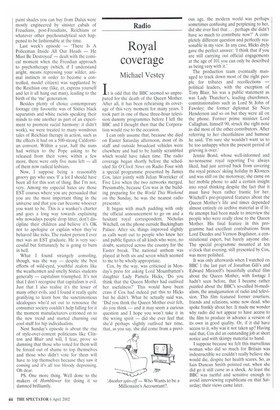Royal coverage
Michael Vestey
It is odd that the BBC seemed so unprepared for the death of the Queen Mother. After all, it has been rehearsing its coverage of this very moment for many years. I took part in one of these three-hour television dummy programmes before I left the BBC and I thought then that the Corporation would rise to the occasion.
I can only assume that, because she died on Easter Saturday afternoon, most of its staff and outside broadcast vehicles were elsewhere and had to be hastily scrambled which would have taken time. The radio coverage began shortly before the scheduled Six Otlock News on Radio Four with a special programme presented by James Cox, later jointly with Julian Worricker of Five Live when the two networks merged. Presumably, because Cox was in the building preparing for the World This Weekend on the Sunday, he was the nearest radio presenter.
It began with much padding with only the official announcement to go on and a hesitant royal correspondent, Nicholas Witchell, on the phone outside Buckingham Palace. After six, things improved slightly as calls went out to people who knew her and public figures of all kinds who were, no doubt, scattered across the country for the Easter break. The national anthem was played at both six and seven which seemed to me to be wholly appropriate.
Cox, by the way, was criticised in Monday's press for asking Lord Mountbatten's daughter Lady Pamela Hicks, 'Do you think that the Queen Mother had outlived her usefulness?' This would have been crass if Cox had indeed put this to Hicks but he didn't. What he actually said was, 'Did you think the Queen Mother ever felt, do you think — and it may seem a curious question and I hope you won't take it in the wrong spirit — did she ever feel that she'd perhaps slightly outlived her time, that, as you say, she did come from a previ ous age, the modern world was perhaps sometimes confusing and perplexing to her, did she ever feel that ... perhaps she didn't have so much to contribute now?' A completely different question and perfectly reasonable in my view. In any case, Hicks dryly gave the perfect answer: 'I think that if you are still carrying out official engagements at the age of 101 you can only be described as being very with it.'
The production team eventually managed to track down most of the right people for tributes and recollections — political leaders, with the exception of Tony Blair, his was a public statement as was Lady Thatcher's, leading churchmen, constitutionalists such as Lord St John of Fawsley; the former diplomat Sir Nico Henderson and so on but they were all on the phone. Former prime minister Lord Callaghan, himself 90, struck the right note as did most of the other contributors. After referring to her cheerfulness and humour he said, 'I'm sure she wouldn't want us to be too unhappy when the present period of grieving is over.'
Jennie Bond, whose well-informed and no-nonsense royal reporting I've always liked, had just arrived back from covering the royal princes' skiing holiday in Klosters and was still on the motorway; she came on her mobile phone to add a certain insight into royal thinking despite the fact that it must have been rather frantic for her. Witchell's pre-prepared features about the Queen Mother's life and times depended almost entirely on archive material as if little attempt had been made to interview the people who were really close to the Queen Mother. His final feature in this programme had excellent contributions from Lord Deedes and Vernon Bogdanor, a constitutional expert, but barely anyone else. The special programme mounted at ten o'clock that evening, still presented by Cox, was more polished.
It was only afterwards when I watched on BBC 1 the last part of Jonathan Gili's and Edward Mirzoeffs beautifully crafted film about the Queen Mother, with footage I hadn't seen before, that I became rather puzzled about the BBC's so-called bi-medialism, the amalgamation of radio and television. This film featured former courtiers, friends and relations, some now dead, who spoke frankly about her. It made me wonder why radio did not appear to have access to the film to produce in advance a version of its own in good quality. Or, if it did have access to it, why was it not taken up? Having said that, Cox did an outstanding job at short notice and with skimpy material to hand.
I suppose because we felt this marvellous woman who did so much for Britain was indestructible we couldn't really believe she would die, despite her health scares. So, as lain Duncan Smith pointed out, when she did go it still came as a shock. At least the BBC was tactful and sensitive enough to avoid interviewing republicans on that Saturday; their views came later.






























































 Previous page
Previous page